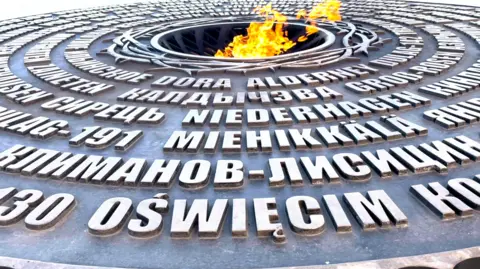BBC Russia editor
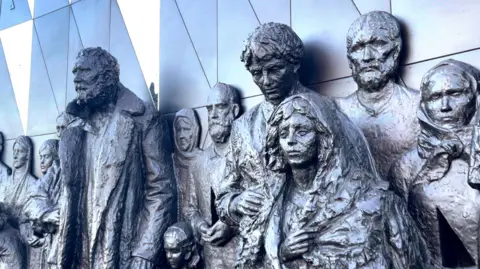 BBC
BBCOn the edge of St Petersburg stands a dramatic memorial more than 40 metres high. At the very top is the figure of a mother with her children.
Down below, depicted in bronze, are real stories of human suffering.
At the bottom of some steps burns an eternal flame surrounded by the names of Nazi concentration and extermination camps.
Auschwitz, Sobibor, Belzec, Treblinka…
Terrifying words synonymous with the Holocaust.
Yet this is not a Holocaust memorial as such. Its official title is “the memorial to Soviet civilians who fell victim to the Nazi genocide”.
I listen to a tour guide as she tells a group of schoolchildren about the Treblinka-2 extermination camp. There the Nazis murdered up to 900,000 Jews.
“Treblinka-2 was a death camp where a large number of people were killed in gas chambers,” she says, without specifying that most of the victims had been Jews.
Russian President Vladimir Putin unveiled the monument last year on 27 January: a date with a double historical significance for Russia. On this day in 1944 Soviet forces broke the almost 900-day siege of Leningrad. Exactly one year later the Red Army entered the gates of the Auschwitz death camp.
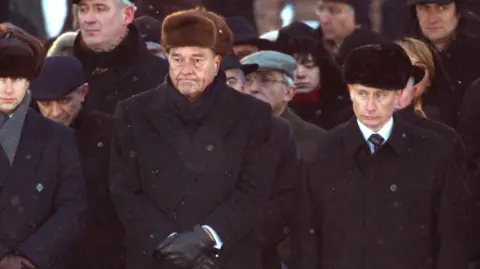 Getty Images
Getty ImagesIt is because of the Red Army’s liberation of Auschwitz that 27 January was later declared International Holocaust Remembrance Day.
But when he opened the memorial to Soviet civilians, Vladimir Putin spoke not of the Holocaust, but of the “genocide of the Soviet people”.
He argued that the Nazis’ aim had been “to seize our country’s rich natural resources and territories, as well as to exterminate the majority of its citizens”.
It’s not that Russia has gone silent on the Holocaust. In the run-up to the 80th anniversary of the liberation of Auschwitz, there have been several Holocaust-related events across the country.
But in Russia today there is a discernible shift in focus, away from the Holocaust to how the Soviet people as a whole, including Russian people, suffered in World War Two. More than 27 million Soviet citizens were killed in what is known here as the Great Patriotic War.
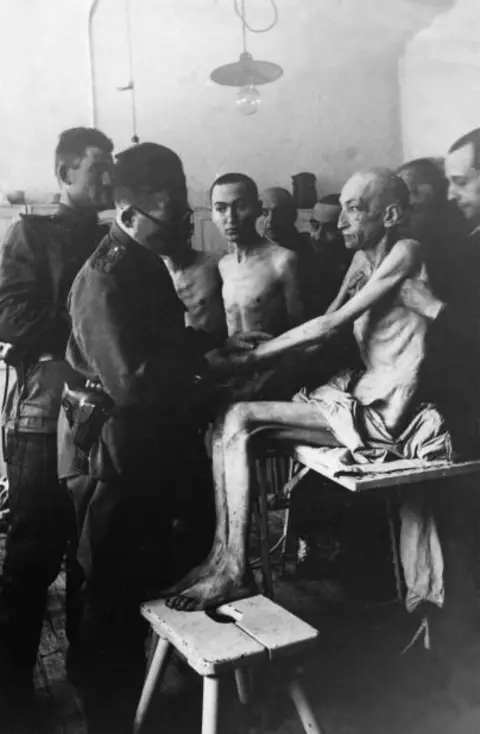 Getty Images
Getty ImagesThis change in emphasis hasn’t gone unnoticed.
“Nobody argues that there were millions of victims during the second world war,” Israel’s Ambassador to Moscow Simone Halperin tells me.
“But an industrialised plan to kill, eliminate, erase from the face of the earth a race: that was against the Jewish people. I think it is of critical importance to remember that the Holocaust was designed as the genocide of the Jewish people.”
“It is not because [the Russian authorities] do not want to speak about the Holocaust or the Jews,” suggests historian and researcher Konstantin Pakhaliuk.
“The idea is about presenting Russians as victims, to feel that we are victims: victims of Western powers, victims in history. That is the core idea of this narrative.”
Konstantin lives and works abroad. Back home he has been declared a “foreign agent”, a label often used to punish critics of the Russian authorities.
He argues that the narrative of Russia as victim has become especially strong since the start of Russia’s war in Ukraine.
“If you are a victim, you cannot bear responsibility,” Mr Pakhaliuk says.
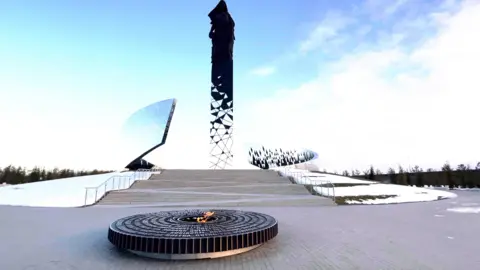
In the Soviet Union there was little public discussion of the Holocaust and what had been the systematic murder of European Jews by Hitler.
On sites of mass execution of Jews by the Nazis, on Soviet territory, there were few monuments or plaques referencing Jewish victims.
That began to change after the fall of Communism. Russian officials began to speak proudly of their country’s historic role in defeating Hitler and saving the Jewish people from extermination.
Twenty years ago President Putin was invited to Poland to take part in events marking the 60th anniversary of the liberation of Auschwitz.
Speaking in Krakow on 27 January 2005 he noted:
“The Nazis chose Poland as the site of the planned mass extermination of people, above all, of Jews… we see the Holocaust not only as a national tragedy for the Jewish people but as a catastrophe for all of humanity.”
“It is our duty to remember the Holocaust,” he added.
Since then, Russia’s relations with Poland, Europe and the West in general have grown increasingly tense, especially after Russia’s full-scale invasion of Ukraine in 2022.
Russian officials have not been invited back to Poland for the 80th anniversary of the liberation of the Auschwitz camp.
“This is the anniversary of liberation. We remember the victims, but we also celebrate freedom,” the director of the Auschwitz Museum Piotr Cywinski wrote last September. “It is hard to imagine the presence of Russia, which clearly does not understand the value of freedom.”
The decision not to extend an invitation to Moscow has been condemned by one of Russia’s most influential Jewish leaders.
“Not inviting Russia is offensive to the memory of the liberators and their contribution to the victory over fascism,” Rabbi Alexander Boroda, president of the Federation of Jewish Communities of Russia said at a press conference recently in Moscow.
“It is a very bad sign because memory is important and there are common values that helped defeat fascism. Despite their differences, the countries of the anti-Hitler coalition, different political systems and ideologies managed to unite… for a common victory.”
Meanwhile, Jewish groups here are doing what they can to remind Russians of the past so that it is never repeated.
“The right wing is on the rise everywhere. The number of Holocaust deniers is increasing,” says Anna Bokshitskaya, Executive Director of the Russian Jewish Congress.
“That’s why it is crucially important to let people know about the events that happened more than 80 years ago.”
